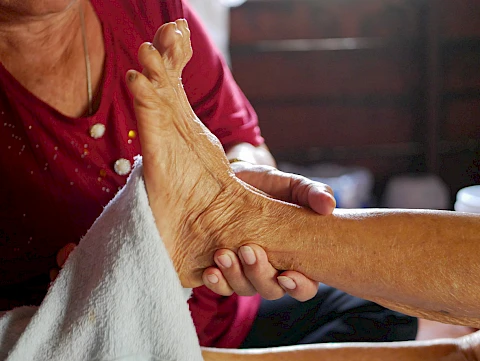
Living with diabetes requires paying extra attention to foot care. The condition can lead to poor blood circulation and nerve damage. This increases the risk of foot problems, making proper foot care especially important for seniors. However, some foot care routines, though well-intentioned, may cause more harm than good. If you’re newly diagnosed with prediabetes or Type II diabetes, knowing which practices to avoid can prevent complications and maintain healthy feet.
1. Avoid Foot Massage Devices
Foot massage devices can feel soothing after a long day, but they might not be safe for those with diabetes. These devices can apply too much pressure, which is risky if you have nerve damage and cannot feel injuries. Instead, try manual massages using your hands where you can control the pressure more precisely. Consulting a healthcare professional for safe massage techniques is another smart move.
2. Reconsider Wearing Open-Toed Shoes
Your choice of footwear matters. Open-toed shoes might be tempting in warm weather, but they expose your feet to injuries. Seniors with diabetes often experience foot numbness, making it easy to overlook tiny cuts or scratches that can become infected. Opt for closed, breathable shoes that offer both support and protection. Shoes with comfortable cushions and adjustable straps work best.
3. Be Cautious With Foot Soaking
Soaking your feet can seem like a relaxing treat, but prolonged soaking can dry out your skin and worsen foot problems. Use a warm, damp cloth to clean your feet instead of long soaks. It is okay to apply a moisturizer afterward to keep the skin soft. However, avoid putting lotion between your toes to reduce the risk of fungal infections.
4. Limit the Use of Corn and Callus Removers
Over-the-counter treatments for corn and calluses are tempting, but these products often contain harsh chemicals. These chemicals can sometimes cause foot ulcers or infections. Regularly using a pumice stone is a safer option. Just remember to be gentle. Consult a podiatrist for personalized care plans to manage common foot issues safely.
5. Skip Walking Barefoot
Walking barefoot might feel freeing, particularly when at home. However, it poses significant risks for those with diabetes. A small injury can quickly turn into a serious problem if it goes unnoticed. Wear well-fitting slippers or shoes indoors to shield your feet. Sturdy shoes offer much-needed protection from the elements and uneven surfaces when you are outside.
6. Be Careful With DIY Pedicures
DIY pedicures can save money, but they do come with risks. Accidentally cutting yourself or applying too much pressure can result in wounds and infections. Consider visiting a professional who understands diabetic foot care instead. Make sure they are experienced and use sterilized tools to minimize any risk. Check with your doctor before you go and let pedicurists know you have diabetes.
Senior Helpers Provides Chronic Disease Care and More
If you’re recently diagnosed with prediabetes or Type II diabetes and are considering getting home care support, we can help. Senior Helpers Northwest Indiana offers a wide range of quality, in-home senior care services, including chronic disease care, assistance with daily living tasks, help with personal hygiene, and more. Contact us to learn more about our services in Crown Point, Hammond, Lake County, and East Chicago!